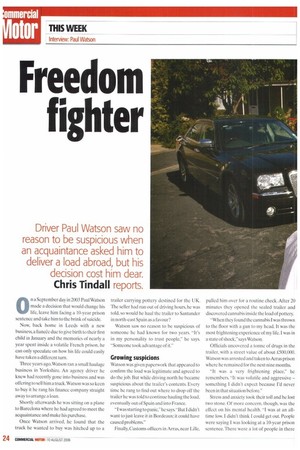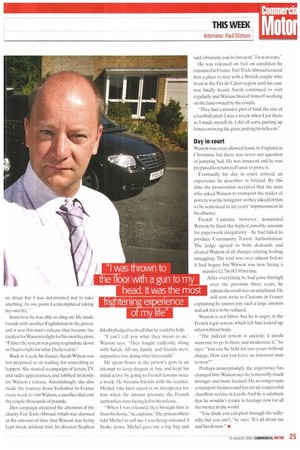Freedom fighter
Page 24

Page 25

If you've noticed an error in this article please click here to report it so we can fix it.
Driver Paul Watson saw no reason to be suspicious when an acquaintance asked him to deliver a load abroad, but his decision cost him dear.
Chris Tindall reports.
0 n a September day in 2003 Paul Watson made a decision that would change his life, leave him facing a 10-year prison sentence and take him to the brink of suicide.
Now, back home in Leeds with a new business, a fiancee due to give birth to their first child in January and the memories of nearly a year spent inside a volatile French prison, he can only speculate on how his life could easily have taken a different turn.
Three years ago,Watson ran a small haulage business in Yorkshire. An agency driver he knew had recently gone into business and was offering to sell him a truck.Watson was so keen to buy it he rang his finance company straight away to arrange a loan.
Shortly afterwards he was sitting on a plane to Barcelona where he had agreed to meet the acquaintance and make his purchase.
Once Watson arrived, he found that the truck he wanted to buy was hitched up to a trailer carrying pottery destined for the UK. The seller had run out of driving hours, he was told, so would he haul the trailer to Santander in north-east Spain as a favour?
Watson saw no reason to be suspicious of someone he had known for two years. "It's in my personality to trust people," he says. "Someone took advantage of it."
Growing suspicions
Watson was given paperwork that appeared to confirm the load was legitimate and agreed to do the job. But while driving north he became suspicious about the trailer's contents. Every time he rang to find out where to drop off the trailer he was told to continue hauling the load, eventually out of Spain and into France.
"I was starting to panic," he says. "But 1 didn't want to just leave it in Bordeaux: it could have caused problems."
Finally, Customs officers in Arras, near Lille, pulled him over for a routine check. After 20 minutes they opened the sealed trailer and discovered cannabis inside the load of pottery.
"When they found the cannabis I was thrown to the floor with a gun to my head. It was the most frightening experience of my life. I was in a state of shock,says Watson.
Officials uncovered a tonne of drugs in the trailer, with a street value of about £500,000. Watson was arrested and taken to Arras prison where he remained for the next nine months.
"It was a very frightening place," he remembers. It was volatile and aggressive something I didn't expect because I'd never been in that situation before."
Stress and anxiety took their toll and he lost two stone. Of more concern, though, was the effect on his mental health. "I was at an alltime low. I didn't think I could get out. People were saying 1 was looking at a 10-year prison sentence. There were a lot of people in there on drugs hut I was determined not to take anything. At one point I contemplated taking my own life."
Somehow he was able to cling on. He made friends with another Englishman in the prison, and it was this man's release that became the catalyst for Watson to fight for his own freedom. "Either the system was going to grind me down or I had to fight for what I believed in."
Back in Leeds, his fiancée Sarah Wilson was not prepared to sit waiting for something to happen. She started a campaign of letters,TV and radio appearances, and lobbied tirelessly for Watson's release. Astonishingly, she also made the journey from Yorkshire to France every week to visit Watson, a sacrifice that cost the couple thousands of pounds.
Her campaign attracted the attention of the charity Fair Trials Abroad, which was alarmed at the amount of time that Watson was being kept inside without trial. Its director Stephen Jakobi pledged to do all that he could to help.
"I can't tell you what they mean to us," Watson says. "They fought endlessly, along with Sarah. All my family and friends were supportive too, doing what they could."
He spent hours at the prison's gym in an attempt to keep despair at bay, and kept his mind active by going to French lessons twice a week. He became friends with the teacher. Michel, who later acted as an interpreter for him when the intense pressure the French authorities were facing led to his release.
"When I was released, they brought him in from his home," he explains. —The prison officer told Michel to tell me I was being released. broke down. Michel gave me a big hug and said.'obviously, you're innocent'. I was in tears."
He was released on hail on condition he remained in France. Fair Trials Abroad secured him a place to stay with a British couple who lived in the Pas de Calais region until his case was finally heard. Sarah continued to visit regularly and Watson busied himself working on the land owned by the couple.
"They had a massive plot of land, the size of a football pitch. I was a wreck when I got there so I made myself fit. I did all sorts, putting up fences, mowing the grass, putting trenches in."
Day in court Watson was even allowed home to England at Christmas. but there was never any question of jumping bail. He was innocent and he was Prepared to return to France to prove it.
Eventually his day in court arrived, an experience he describes as farcical. By this time the prosecution accepted that the man who asked Watson to transport the trailer of pottery was the instigator, so they asked for him to be sentenced to six years imprisonment in his absence.
French Customs, however, demanded Watson be fined the highest possible amount for paperwork irregularity -he had failed to produce Community Transit Authorisation. The judge agreed to both demands and cleared Watson of all charges relating to drug smuggling. The trial was over almost before it had begun, but Watson was now facing a massive £2.7m (€3.91 m) line.
After everything he had gone through over the previous three years, he admits the result was an anticlimax. He will now write to Customs in France explaining he cannot pay such a large amount and ask for it to be reduced.
Watson is not bitter, but he is angry at the French legal system, which left him locked up, often without hope.
—The judicial system is ancient: it needs someone to go in there and modernise it," he says. "You can be held for two years without charge. How can you leave an innocent man to stew?"
Perhaps unsurprisingly, the experience has changed him. Wa Bon says he is mentally much stronger and more focused. He no longer runs a transport business and has set up a successful chauffeur service in Leeds. And he is adamant that he wouldn't return to haulage now for all the money in the world.
"You think you can plod through life willynilly, but you can't," he says. "It's all about me and Sarah now."•




























































































































































































